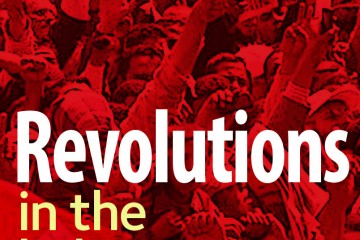
Exit Strategies and State-Building
Richard Caplan’s new book, Exit Strategies and State Building, fills a noticeable void in the otherwise rapidly expanding literature on international state-building. Despite the volume of scholarly attention dedicated to issues of peace- and state-building of recent decades, relatively little consideration has hitherto been given to questions regarding the “end game” of post-conflict state-building operations. This book seeks to address that gap and, therein, examine one of the most contentious issues for any state-building operation; the decision of when and how to leave.
Exit Strategies and State Building comprises a collection of chapters written by expert academics in the field and high-level practitioners with extensive experience on the ground during these missions. It is therefore both a well-informed and rounded contribution to the literature and essential reading both for scholars of post-conflict state-building and policymakers alike.

Democratic wealth: Could republican ideas provide the framework for a new economy?
Call yourself a ‘Republican’ today and people will either think you are a member of the US political party or want to guillotine the Queen. Yet a resurgence of interest in republicanism within academic circles is reclaiming the tradition, while the post-crash political landscape has brought to the fore demands for citizen participation and an interest in sharing control of the economy that can be read as republican in spirit.
An emerging contemporary republicanism within academic circles could provide a framework for building a citizen-led economy. But is there the political will to begin developing this kind of agenda?
In ‘A Discourse on Political Economy’, Jean-Jacques Rousseau gave his take on how a government should tackle inequality: ‘prevent extreme inequalities of fortunes; not by taking wealth from its possessors, but by depriving all men of means to accumulate it; not by building hospitals for the poor, but by securing the citizens from becoming poor’. This is a pretty good definition of today’s buzzword ‘pre-distribution’. Rousseau was a republican who applied these principles to his thinking on the economy, and it is this tradition of economic republicanism that is now being re-examined within academia. Since the first colloquium on the subject was held in Paris in 2007, thinkers across Europe and the US have been furthering the application of republican thinking to the market-driven developed world. Spain, where republican theory was explicitly used as a guide by the Zapatero government in 2004-2011, has provided practical insight in this field, while in the Republic of Ireland, Fintan O’Toole has argued for radical reform to implement genuine republicanism. We might expect American academics such as Michael Sandel, Alex Gourevitch and Thad Williamson, but the renewed interest in academic circles is not limited to republics. In Britain, the work of Phillip Pettit and Quentin Skinner is being read in a new light, towards developing a republicanism that can provide an alternative to market domination.

The Future of the Union: Stick or twist?
I want to consider the constitutional implications for the United Kingdom following September’s referendum on Scottish Independence.
If Scotland votes ‘No’
The constitutional consequences are easier to see in the case of a `No’ vote in September. Scotland is then almost certain to be offered more devolution, since all three major UK parties have promised further devolution of taxation powers. That, however, could further unbalance its position in a United Kingdom based on asymmetrical devolution. It is possible that the English Question would be resurrected, and that the Union would come under threat, not from Scotland but from England. England of course is by far the largest and most populous part of the United Kingdom, but the only part of the United Kingdom without a Parliament or assembly of her own. It is therefore the anomaly in the devolution settlement. But her reliability has perhaps been taken for granted, and English nationalism has not, until recently been a political force of any moment. Part of the reason for this no doubt is that, with a characteristic lack of logic, many in England have failed to recognise the distinction between being English and being British, treating the two as interchangeable. This may now be changing as a result of devolution and of euroscepticism, stronger in England than in other parts of the country. Perhaps UKIP is best understood as an English nationalist party, the English equivalent to the SNP. It favours an English parliament.

Bahrain beyond 2011: an economy on the upswing?
The decision taken by France’s Credit Agricole and Japan’s Tokyo-Mitsubishi bank to leave Bahrain following the unrest in 2011 sparked widespread fears of a mass exodus of financial institutions and led to a slump in investor confidence, casting a shadow of doubt over the performance of Bahrain’s economy. However, three years later, these initial fears seem rather misplaced. Despite a drop in investor confidence, Bahrain’s financial sector has remained intact, and economic growth has rebounded to pre-2011 levels. In the 1980s, in the wake of the Lebanese Civil War, Bahrain established itself as a regional financial center. In recent years, Bahrain has faced intense competition from Dubai and increasingly Qatar, but it has proven resilient due to its solid regulatory …

Evaluating Mutuals and Employee-Owned Businesses: Which values are relevant?
Across the political spectrum there is a growing interest in mutuals and employee-owned businesses (or MEOBs).[i] At the same time, the crisis in the Co-op group has thrown open the question of what the underlying values and objectives of co-operative enterprise are or ought to be (see also Hunt 2014 and Bastani, Benjamin and Coppola 2014). What constitutes good or bad performance for an enterprise that is a mutual or employee-owned?
In much conventional economic discourse we approach enterprises primarily in terms of one measure: profitability. An enterprise performs well when, and to the extent that, it is profitable. Given certain assumptions, this means it is performing efficiently. But is this really all there is to evaluating how well an enterprise performs?

Co-ops and Mutuals: a better way?
A debate is emerging in the UK and elsewhere about the possible role of cooperatives and mutuals in building a better economy. But what makes for good performance by a co-op or mutual? What values should enterprises of this kind seek to embody or promote? How can they do it? These questions are, in part, questions about the underlying moral and political philosophy of co-operatvism and mutualism. A British Academy-funded research project, currently being run at Kellogg College’s Centre for Mutual and Employee-Owned Business, aims to explore these questions and develop a framework for evaluating cooperative and mutual performance. The research team would like to know what you think of their ideas. We invite your comments below each article.

List of Books for Review
Politics in Spires is launching a new series in which contributers are invited review books written by Oxford academics. If you know of a recent (last 24 months) book by anyone at Oxford please submit it to katharine.brooks@politics.ox.ac.uk. Here is a provisional list of books for review:
Algeria: Why Today’s Elections Are Essential
Since the partitioning of the Sudan, Algeria is the largest African country and a primary regional power in the Mediterranean region. Therefore, the condition of this North African pivot-state is essential for Europe: Algiers is the 3rd largest energy supplier to the EU, while its population of 38 million inhabitants, its anti-terrorism security expertise and the size of its armed forces (130,000 men) make their security capabilities necessary to the stability of the Sahel zone. Moreover, with a gross domestic product (GDP) of 208 million dollars in 2013, Algeria remains the largest regional economy. Algiers was the least affected by the wave of the Arab Spring despite negative societal indicators. This situation contrasts with that of Tunisia or Egypt, notably due to politics of large redistribution of riches gained from oil revenues, but also due to the people’s fear of a return to a decade of stagnation.
Nevertheless, the relative calm in this country during the last three years should not lead one to believe that the upcoming presidential election is not without high stakes. In fact, the trajectory of this powerful regional presence is uncertain for at least two reasons. First, the country’s socio-economic dynamic is worrisome. Second, the security dynamic is deteriorating given that Jihadist groups have found new resources. Thus, in the context of a tense regional framework, the Algerian situation is more important today than ever before.









